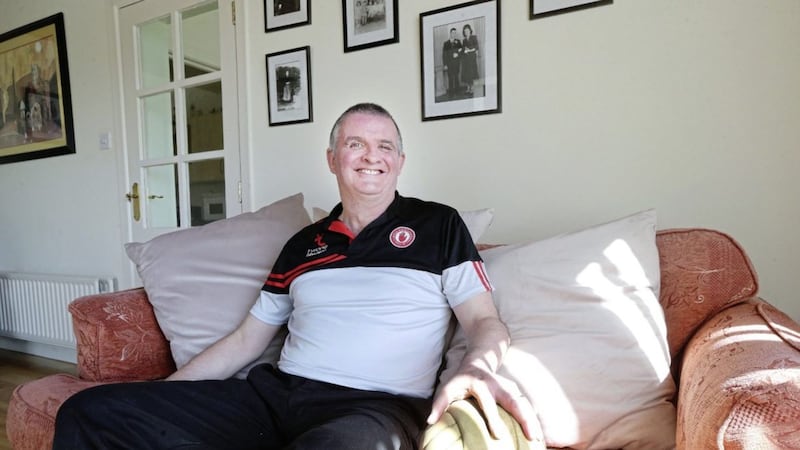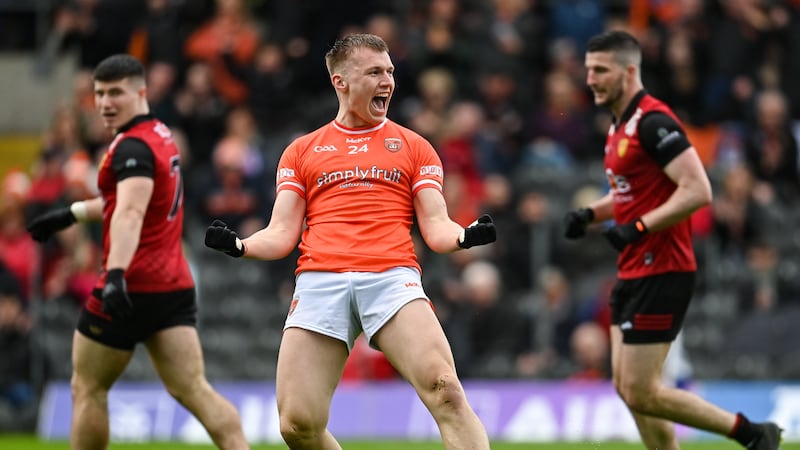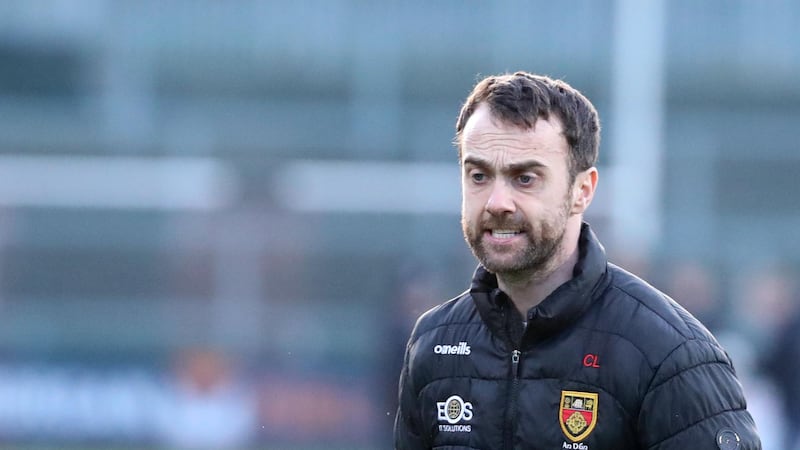IT FELT like nothing more than an insignificant irritation when mild flu symptoms tempered the pace of a busy existence one February afternoon back in 2012.
But lurking beneath the surface was the genesis of an insidious condition that would rob a healthy 52-year-old of his health, his freedoms, his independence, and many of the simple, precious joys and pleasures once shared with a loving family.
To this day, Paddy Ball continues to search for answers, for the breakthrough in medical and scientific research which will one day provide the key to freedom from the prison which his own body has become.
This mysterious, unforgiving and relentless neurological disorder has mystified leading specialists for the best part of a decade, successive medics unable to diagnose a debilitating condition that has ravaged one of Tyrone’s gaelic footballing icons.
Now just a shadow of the elegant, athletic and powerful wing-back who graced the country’s GAA fields back in the eighties, he has accepted a cruel new normal with the grace and courage which have defined the stoic being that he is.
His outstanding performances through the Red Hands’ run to the 1986 All-Ireland final weren’t enough to land the Sam Maguire, but did earn the Clann na nGael man an All-Star nomination.
Coaching and management with the club followed as a natural progression after his retirement as a player at the age of 40.
But those deeply personal, enriching connections have been mercilessly severed, as have the firmly knotted ties to every aspect of a fulfilling social and professional life, his dignity attacked and diminished.
Having already won a battle with cancer, he faced into a new life challenge which would change everything.
Now, confined to a specially adapted wheelchair and dependent on the constant care of wife Colette, son Damien, daughter Grace and a fantastic team of carers, Paddy finds no place for self-pity, no interest in allowing himself to be consumed by anger.
“I’m not bitter about the cards I’ve been dealt. I have met a lot of great people before my illness and a lot of great people after my illness, too many to mention,” he says.
The turmoil that invaded the Ball household back in 2012 began as a gentle breeze, and whipped up into a whirlwind of despair.
Flu symptoms progressed swiftly to a rapid deterioration, and within a few months, Paddy was totally incapacitated.
By June, following several weeks of extensive investigations as an in-patient at the Royal Victoria Hospital, his family were informed by consultant neurologists that he was suffering from a progressive neurodegenerative disorder, with no definitive diagnosis.
Worse still, the shattering news was accompanied by an opinion that the condition was untreatable, with no prospect of rehabilitation.
He was transferred to Altnagelvin in mid-July to be closer to family, friends, and his north Tyrone home.
Ten weeks spent in the Derry hospital were followed by a further three week spell in Spruce House, a neuro-disability specialist facility.
In the meantime, a care plan was put in place to meet his needs in the domestic environment, and Paddy returned to his Belix Lower home in October 2012.
“I had experienced flu like symptoms over a number of weeks for which antibiotics were prescribed, to no effect.
“What followed was a shake in my left hand, then a rapid deterioration of balance and other motor skills, culminating in not being able to stand or walk by the end of April 2012.
“Other symptoms included speech defects and the inability to write.”
It was in May of that year that his brother Danny, a former Tyrone senior football team manager, his wife Josephine and Paddy’s wife Colette took him to Belfast City Hospital for a scan.
But it was clear that something sinister was at play from within.
“From there, I was too unwell to travel home so they brought me to the Emergency Department in the Royal.
“There I was admitted and spent 10 weeks in Neurology Ward 4E. Extensive tests were carried out during this period with no diagnosis, prognosis and therefore no treatment. I was told there was no potential for rehabilitation.
“At this stage I was completely bed-bound and dependent on nursing staff for care and daily tasks.”
During the course of 2013, with the help of rehabilitation during respite stays at Spruce House, he made some progress, and was now able to sit up and manage a few steps with the aid of a walking frame.
“The progress of rehabilitation over the next few years was slow and hard. Spruce House have provided respite, but not since Covid entered the world.
“The rehab progression helped me improve to the point where I now can read newspapers, books, complete Sudoku, word searches, use an iPad as well as attending a very good and engaging Strabane Day Centre three times a week.”
The love and care provided by family members has galvanised the bond within a devoted household unit.
A strong faith, along with solidarity from the community and the loyalty of long-standing friends constantly lift spirits and help Paddy maintain a remarkable sense of positivity.
“Yes it has been vital. I am lucky to be surrounded by great family and great carers. I appreciate all of them.
“I am also thankful to all the doctors, nurses, physios, OTs and social care workers over the years. I am extremely proud of my wife Colette and my children, Damien and Grace.
“My faith is still important to me today. Our parish priest Fr Eamon McDevitt called to the house with Holy Communion for me on a regular basis before Covid.”
A successful career as Regional Sales Manager for Northern Ireland with drinks company Quinn’s of Cookstown, later taken over by C&C, came to an inevitable end, removing another layer of an existence rich in productivity and achievement.
Friends rallied, and the support of the community was always at hand, with the Clann na nGael club joining forces with Newtownstewart Golf Club to organise a fund-raiser in 2013, the Paddy Ball Golf Classic.
“The generosity of everyone who donated is still appreciated, and the list is too long to name everyone.”
A passion for gaelic football development at an early age, while attending Belix Primary School, and following its closure, Altishane Primary School.
Parish Priest Fr O’Connor organised a tournament for the primary schools of Donagheady parish, and for the young Patrick Ball, this was his first big break.
“When he visited the school and announced the tournament, I picked the team during the next break-time outside. We went on the win that tournament.
“At home, I always played outside since I was able to walk and have a ball in my hand.”
By the time he was 18, he was a regular on the Aughabrack Daniel O’Connell’s senior team, helping the fledgling club, founded in 1978, march straight from Junior to Senior football with successive promotions.
“During these years, I played predominately midfield or centre half forward. In our first year in Senior football, we briefly topped the league, but during those years there were no trophies to show for our efforts and performances.”
An Ulster Minor Championship winner with Tyrone in 1976, he captained the team a year later, and a call-up to the senior squad followed immediately.
“Jody O’Neill, the then senior manager, asked Brendan Harkin, a Killyclogher man and a teacher in Omagh CBS, if there were any good players north of Omagh, and Harkin mentioned my name.
“I was called up to the panel in my final year at the grammar school at the age of 18.
“I made my debut in the same year against Donegal in the McKenna Cup in Ballybofey playing left half forward. I was marked by Finnian Ward, who worked for the Gaeltacht radio.”
Soon a regular in the senior side, he was appointed captain of the U21 team in 1980, captaining the Red Hands to an Ulster title with victory over Down in the final.
Meanwhile, inter-provincial recognition was an inevitable consequence of consistent stand-out displays in National League and Ulster Championship, and Ulster manager Brian McEniff came calling in 1982.
“To be called up for the Railway Cup was a great honour. I enjoyed sharing the commute to the Ulster training with Maghera’s Mickey Moran and Dungiven’s John Somers.”
In 1980, Art McRory took over as Tyrone senior manager, and was to be a major influence on Ball’s career.
McRory was to lead the county to new heights in a first ever All-Ireland final appearance.
“Art was a big influence on me and still visits me to this day. He was a no-nonsense type of manager and straight to the point.”
Ball would be an integral part of that 1986 revolution, despite a career-threating injury which demanded four years of recovery and rehab.
“I missed four years of my county career because of a car accident on the 19th April 1982 on the Cookstown line, on my way to work at Quinn’s.
“The injuries included a broken pelvis and a few cuts. I made my comeback playing for the Tyrone Juniors in 1986 (this team won the Ulster Championship in ’86), which eventually led to Art recalling me back to the senior panel for the beginning of the ’86 championship campaign.
“After defeating Down in the Ulster final, we played against Galway in the semi- final, where I came on and marked Gay McManus, a Galway great. That Ulster final victory over Down completed the collection of provincial medals from minor, U21, Junior and Senior grades. To my knowledge, I am one of the few players to have achieved that feat.
“In the build-up to the final against Kerry, the whole squad was quite relaxed.
“Even the Kerry players admitted after the game, if we had have scored a goal from the penalty which would have put us nine points up, they would have lost.
“Playing in Tyrone’s first All-Ireland final appearance was the highlight of my career and the final step of the comeback from the car crash. I was proud to be nominated for an All-Star that year.
“Over the years, all Tyrone team-mates became good friends. Since my illness, a number of county and club friends have come to visit and send well wishes, including Aidan Skelton, Joe and Mickey Mallon, John Lynch, Noel McGinn, Eugene McKenna, Damian O’Hagan, Paudge Quinn, Terry McCann, Enda Kilpatrick, Peter Canavan, Fergal Logan, Brian Dooher, Stephen O’Neill and Aidan McMahon – too many to name.
“In addition to former team mates, former work colleagues and other friends have visited and sent well wishes too, including Fr Michael Doherty, Mickey Harte, Ciaran McLaughlin (former county chairman), Emmett and Nuala Quinn, Tom Devlin, Finbarr McNamee and Peter McBride.”
Following the highs of an inter-county career, the problem of rural depopulation was bringing a harsh reality into sharp focus in parts of north Tyrone.
Aughabrack and neighbouring Dunamanagh were both struggling for numbers, and through a protracted process of soul-searching and straight talking, a decision was taken to amalgamate the clubs in 1996.
In its initial season, the new club was known as Donagheady, the parish name, but Ball’s proposal at AGM to re-name as Clann na nGael (Family of Gaels) was carried.
“We won the Junior double in 1997 and the Intermediate double in 1998.
“I played with Clann na nGael until the end of the 2000 season at forty years of age. After finishing playing, I became involved with coaching and managing, both under-age and senior over the next decade.”
As manager, he led his side into countless ferocious battles, but none of those could have prepared him for the war that was to be waged against his own physical wellbeing.
April 27, 2011, and a diagnosis of bowel cancer stopped a previously healthy and active individual in his tracks.
Thankfully, the illness had been detected early, and following successful surgery, recovery without recourse to chemotherapy followed.
By August of that year he had returned to work and was back on the sideline as manager of the Clann na nGael senior team.
Months later, however, came his greatest challenge, with the onset of the neurological condition which has to this day baffled top medics.
But there is fresh hope. In January 2020, a recently appointed doctor at the Royal Victoria Hospital picked up the case, and began the pursuit of new avenues of investigation.
Parkinson’s Disease and Dementia have been ruled out, and doctor, patient and many others live in hope that the results of recent tests will shine a light on a medical mystery and provide stepping stones for a pathway to recovery.




